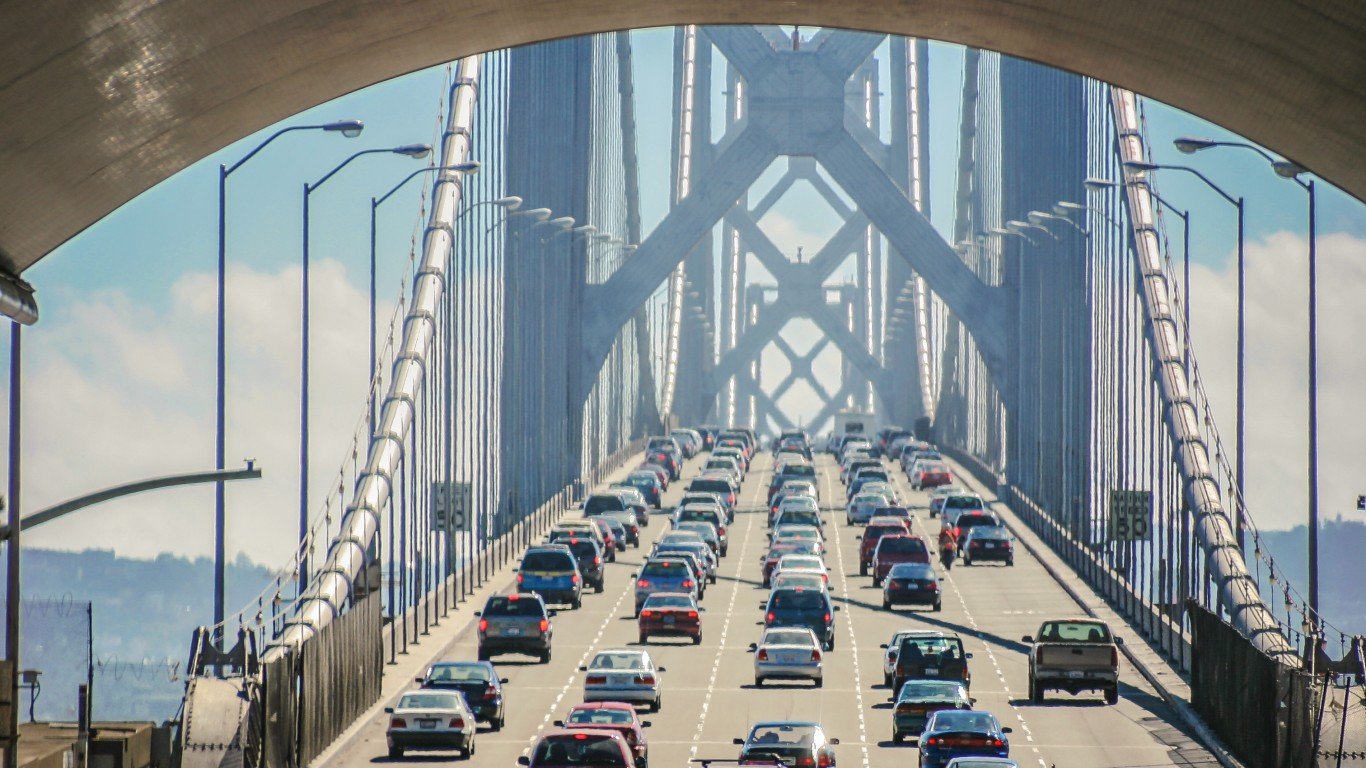

The California Public Utilities Commission (CPUC) on Thursday issued a new ruling that affects Lyft Inc. (NASDAQ: LYFT) and its competitors, including Uber Technologies Inc. (NYSE: UBER). The ride-share and ride-hailing companies have been fighting with the California regulator, the state legislature and the governor over the status of their drivers.
[in-text-ad]
A state law (called AB5) went into effect in January stating that Uber and Lyft drivers are employees of their companies, not independent contractors. The two companies were once poster children for the gig economy, but the COVID-19 pandemic likely ended forever praise for the freedom that gig workers have to work when and how they choose. Along with those freedoms comes freedom from unemployment insurance, workers’ compensation and health insurance.
Even though AB5 has been the law in California since the beginning of the year, Lyft, Uber and others have fought the new law in court. They also have sponsored a measure that will appear on the November ballot, changing AB5 by once-again allowing ride-hailing services to categorize drivers as independent contractors. The measure, if passed, also would scale up pay and add some benefits for drivers.
The CPUC ruling, however, does not favor San Francisco-based Lyft and the others.
What the CPUC Ruled
Since 2015, the CPUC has been authorized by the state legislature to regulate what the state calls transportation network companies (TNCs). As the commission has worked to clarify its role in regulating the companies, it sought data last year from the TNCs regarding two issues: sexual assault and harassment claims and how AB5 applies to TNC drivers.
The ride-hailing services claim that their drivers meet the three criteria spelled out in AB5 for independent contractors. They are free from the control and direction of the hiring firm. They perform work that is outside the usual course of the company’s business. And they are customarily engaged in an independently established trade, occupation or business of the same nature as that involved in the work performed.
The dispute has gotten increasingly litigious. In early May, California’s attorney general and city attorneys for the state’s three largest cities filed suit in state Superior Court seeking injunctive relief. It also sought unemployment insurance premiums and penalties for failure to pay the premiums because the companies misclassified their drivers as independent contractors.
Furthermore, Uber has filed for an injunction in federal court seeking relief from AB5. Lyft drivers have sued Lyft in federal court as well, seeking an order for the company to reclassify all drivers from independent contractors to employees.
The CPUC acknowledges the ballot measure and the various lawsuits, but it declares that it is required to do its job: “Thus, for now, TNC drivers are presumed to be employees and the Commission must ensure that TNCs comply with those requirements that are applicable to the employees of an entity subject to the Commission’s jurisdiction.”
Implications of the Ruling on Lyft
In the Superior Court suit, the plaintiffs noted:
The time has come for [these] massive, unlawful employee misclassification schemes to end. The People bring this action to ensure that Uber and Lyft ridehailing drivers—the lifeblood of these companies—receive the full compensation, protections, and benefits they are guaranteed under law, to restore a level playing field for competing businesses, and to preserve jobs and hard-won worker protections for all Californians.
Lyft shares had lost about 10% as of Wednesday’s closing bell after regaining about $9.50 per share since June 2. Shares traded down more than 6% shortly before noon Thursday, following the release of CPUC’s ruling late on Wednesday. On June 8, Lyft stock was down less than 5% for the year to date, compared to a current drop of more than 16%.
Treating drivers like employees could add 20% to 30% to a company’s expenses. Not having to pay a minimum wage, overtime or other benefits is a major cost-saver for these firms. Drivers also pay their own expenses, including maintenance and fuel.
That’s the main reason that Lyft, Uber, Doordash, Postmates and Instacart have committed $110 million to fight AB5. A competing group, the Coalition to Protect Riders and Drivers, opposes the ballot initiative and has raised almost $700,000 to fight the companies’ ballot measure. The Transport Workers Union of America has contributed $500,000 of that total.
A recent class-action lawsuit filed against Lyft by a former driver in Washington, D.C., contends that the company is violating a local law on paid sick days. The driver, Cassandra Osvatics of Bowie, Maryland, says the company is contributing to the spread of COVID-19 by its failure to provide paid time off for drivers who are ill.
Lyft claims that it is “committed to helping drivers during the pandemic” but that “[f]orced reclassification would jeopardize access to thousands of dollars in federal funds at the worst possible time.” The worst possible time for whom?
Take This Retirement Quiz To Get Matched With An Advisor Now (Sponsored)
Are you ready for retirement? Planning for retirement can be overwhelming, that’s why it could be a good idea to speak to a fiduciary financial advisor about your goals today.
Start by taking this retirement quiz right here from SmartAsset that will match you with up to 3 financial advisors that serve your area and beyond in 5 minutes. Smart Asset is now matching over 50,000 people a month.
Click here now to get started.
Thank you for reading! Have some feedback for us?
Contact the 24/7 Wall St. editorial team.



